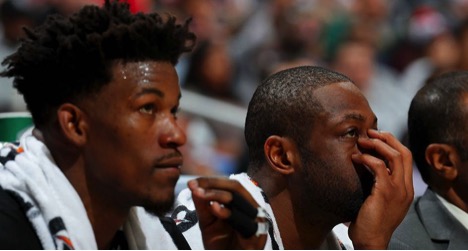
The Growing Trend of the NBA Community to Vent Publicly
In the last week, the NBA has witnessed what appears to be a growing trend among its teams and players. The media has become the forum for players, coaches, teammates, and organizations to call each other out. Whether through real time interviews, tweets, or Instagram posts, venting publicly is the new way for members of the NBA to voice their frustrations.
Given the media coverage of these incidents, it’s easy to view this as a player-only phenomenon. After all, they are the ones with huge social media followings, and for some, personalities that feed off attention even at the expense of embarrassing those around them. That said, NBA coaches and owners are equally guilty of sharing locker room or organizational problems with millions of basketball fans.
It wasn’t too long ago when former Toronto Raptors coach Sam Mitchell called out a few players for ending the game with a scoreline of “Zero, zero, zero, zerooo!” Two days into the 2016-2017 regular season Tom Thibodeau, coach of the Minnesota Timberwolves, called his team out publicly for lacking toughness. A couple months later, George Karl, one of nine NBA coaches to have amassed one thousand wins, released a book in which he insulted a number of past players. He went as far as to speak ill of the manner they were raised. George Karl could be considered a repeat offender; just last year, during his one year with the Sacramento Kings, he publicly bickered with star player Demarcus Cousins before being fired.
As unprofessional as George Karl’s actions have been, Phil Jackson, President of the New York Knicks, might take home the 2016-2017 MVP honors for public venting. In November, he referred to Lebron James’ friends and business partners as a “posse,” which he was rightly criticized for doing. Soon after, he called out Knicks veteran and leader Carmelo Anthony, and has continued to take public shots at Carmelo. For his part, Carmelo has chosen to stay professional and not take any issues he has with Phil or the organization out into the public.
In 2010, Lebron took his talents to South Beach to team up with friends Dwyane Wade and Chris Bosh. In response to what was considered desertion by some, Dan Gilbert owner of the Cleveland Cavaliers infamously wrote a letter in comic sans font, referring to Lebron as a coward and vowing to win a championship before Lebron did in Miami. As it turned out, the Cavaliers would have to wait until Lebron returned before the franchise won its first championship.
Venus Williams eloquently summarized the beauty of sport:
“What I will say about sport, I think why people love sport so much, is because you see everything in a line. In that moment there is no do-over, there’s no retake, there is no voice-over. It’s a disaster witnessed in real-time. This is why people live and die for sport, because you can’t fake it. You can’t. It’s either you do or you don’t.”
It can be argued that for some fans, seeing players share their frustration on a public forum makes them more relatable and real. Sport is an outlet, and for many fans a way to root for a team or athlete who can do what they wish they could. In this sense, maybe we like seeing athletes criticize each other because we can’t do the same in a similar manner without having steeper consequences. Can you imagine going on CP24 and venting your frustration with a professor? It probably wouldn’t go over too well.
As real as these incidents make the people involved appear, one must wonder how useful it is for the long-term success of a team to have its dirty laundry shared in the media. NBA greats, including Kevin Garnett and Charles Barkley, have spoken out in response to the increase of public admonishing. Shortly after Chicago Bulls Dwyane Wade and Jimmy Butler publicly called out teammates (for a second time that season), Kevin Garnett said that locker room problems must be dealt with in the locker room. He reminded the NBA community that the sanctity of the locker room must be protected. After Lebron publicly criticized his team and the franchise for not adding another playmaker to essentially the same roster that came back from down 3-1 to win the 2016 championship, Charles Barkley referred to Lebron as “whiny.”
Regardless of whether or not you believe that people in the sports world should use the media to vent their frustrations, sooner or later those involved must realize that nothing positive will result from these incidents. Rather than repair any issues that players, coaches or management are upset about, going to the media undermines trust, creates divides and ultimately hurts team chemistry.
